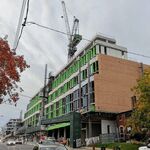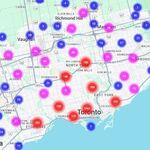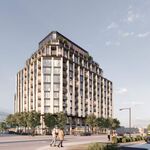From the Globe and Mail this morning. I won't post all 3 pages. If people wish me to, just ask and I will:
From page 1:
http://www.theglobeandmail.com/repo...ck/article13327917/?page=3#dashboard/follows/
Real estate revival: America’s property markets make a comeback Add to ...
JOANNA SLATER
MIAMI — The Globe and Mail
Published Saturday, Jul. 20 2013, 8:00 AM EDT
Last updated Saturday, Jul. 20 2013, 8:00 AM EDT
On a recent sunny Friday morning, Jorge Perez, the ruling magnate of Miami real estate, strode into the living room of his waterfront home and settled into an overstuffed chair with a view of Biscayne Bay. A small, fluffy white dog named Samson jumped into his lap.
The developer was in casual mode – jeans, a blue-and-white striped shirt, slip-on shoes – and preparing to leave for a vacation in Tuscany. In conversation, he had the expansive air of someone who has veered close to disaster and lived to tell the story. After all, it wasn’t so long ago that his company was nearly crushed in the real estate collapse.
There is no shortage of indications that Miami, after tanking during the housing collapse, is back in business. In and around Miami Beach, there is a flowering of new buildings aimed at attracting the ultra-wealthy, including one featuring “sky garages” – parking spots just outside the entrance to your high-rise unit, accessible by a car-sized elevator. But it’s not just the luxury segment that is surging.
Miami also has the advantage of drawing a considerable number of international buyers – whether from Latin America, Russia or Canada. “Miami has really stepped up to be the hottest city in the world,” said Stephen Ross, chairman of Related Cos., a major New York developer.
In photos: Four hot spots in the U.S. housing recovery
infographic
How home prices are trending in four U.S. hot spots
Video: Money Monitor: Is it a good time to buy U.S. property?
Video
Video: How much would you pay to live in Toronto's Liberty Village?
Mr. Perez was the biggest builder in the largest condominium bubble in the United States and the most prominent developer in Florida, a state that epitomized the frenzy of overbuilding and speculation during the boom years.
“They say the bigger they are, the harder they fall, right? That’s true. So we fell,” said Mr. Perez, 63. “You’re God’s gift to the world, you’re the golden boy – and then nobody wanted to talk to me. You go from being the hero to being the goat.”
Now the chastened mogul is facing the most improbable outcome of all: Business is roaring again as the U.S. housing market pulses back to life. Mr. Perez’s firm – Related Group – has more than forty projects in the works in the region. Next month, the company will complete its first condominium built since the crash, a sold-out tower in Miami. In the past two weeks alone, it announced two more brand-new condo projects.
Across the country, there are variations on the same story as builders get back to work, eager to capitalize on rising home values and pent-up appetite. After six long years of destruction – housing prices nationwide peaked in 2006 and hit bottom in 2012 – the U.S. housing market is mounting a comeback.
In the twelve months through April, home prices in the country’s 20 largest metropolitan areas rose 12 per cent, the fastest increase in seven years, according to the widely-followed S&P/Case-Shiller Index.
How Mr. Perez managed to haul his company out of the abyss is a tale that shows the unexpected vigour of the U.S. housing recovery but also its limits.
While Mr. Perez is building again, the way he’s doing it bears little resemblance to the credit-fuelled construction of the bubble years. And every day he reminds himself of the perils of too much optimism.
So Mr. Perez is moving carefully but also quickly.
“Will there be a bust?” he asked, looking out at his swimming pool and the shining sea just beyond it. “Yes. The question is when. People used to say there are three important things in real estate: location, location, location. Now I say, it’s timing, timing, timing.”
Already, the real estate recovery has provided a concrete lift to Mr. Perez’s fortunes: Earlier this year, he returned to the annual list of billionaires compiled by Forbes magazine, his first appearance there since 2008.
“Most guys in his position would have gone under,” said Jack McCabe, who heads a real estate research and consulting firm in Deerfield Beach, Fla. “Now he’s back and primed and ready to go – and may end up being bigger than he was before.”
The long road back
When the housing market in South Florida collapsed, it was common to hear predictions that it would take 10 or 15 years to work through the glut of properties built prior to the crash. It didn’t turn out that way.
In Miami and elsewhere, the rebirth of the housing market has had an untraditional midwife: investors. Across the country, an array of players – private equity firms, hedge funds, wealthy individuals – have snapped up properties at rock-bottom prices, which helped put a floor under the market at a time when regular buyers remained fearful.
Miami is a turbocharged version of what happened nationwide:
From their peak in 2006 to their nadir in 2011, home prices in the city fell 51 per cent, S&P/Case-Shiller figures show. Since then, they have risen 17 per cent to levels equivalent to what prevailed back in 2003.
For now, housing remains a relative bargain. Jed Kolko, an economist at Trulia Inc., an online real estate site, noted that U.S. home prices are about 7 per cent below fair value, judging by their historical relationship with personal income and rental rates.
Of course, there is no shortage of reasons to worry. Mortgage rates are rising, though over all they remain low. Land prices have spiked, suggesting a return to speculation in some parts of the housing market. The investors who have piled into real estate will not wait forever to realize a return, creating a sizable contingent of future sellers.
Single page
1
2
3
A few observations: the largest developer is talking "timing" vs. "location" as being the prime factor......
One can extrapolate that there are at least in Mr. Perez's view a reason one can conclude not buy real estate at certain times.
The drop was 51% so those who feel we can't have a 25% drop here in Toronto should think again.
The corollary to this however is: Miami trebled over 6 years. This resembled Toronto from 1985 to 1989 when it almost trebled and fell about 40%. Toronto essentially doubled this whole time from 1998 onwards. To expect a comparable drop here as some have postulated or hope is probably not realistic.
The purchasers in Miami are from Latin America, Russia and Canada (not so much the locals due to difficulties with mortgages) looking to put their money in a safe place.
In Toronto we have Asia (China and India), Russia, Iranians and other parts of the Middle East and a few Europeans....but the concept is the same.
I point this out because despite a US stock market that from 2009 has risen 100% there is still a large of money going into real estate in the US....granted after a significant "bargain sale".
Finally, Mr. Perez is taking 40% down payments now which does ensure less likelihood of a mass of developer units hitting the market at once. Canada is still only taking 20%-25% from foreign investors and perhaps the percentage should go up. This would provide a further cushion and avoid the destructive rapid destruction of the real estate market and the condo market in TO and perhaps Vancouver in particular.



